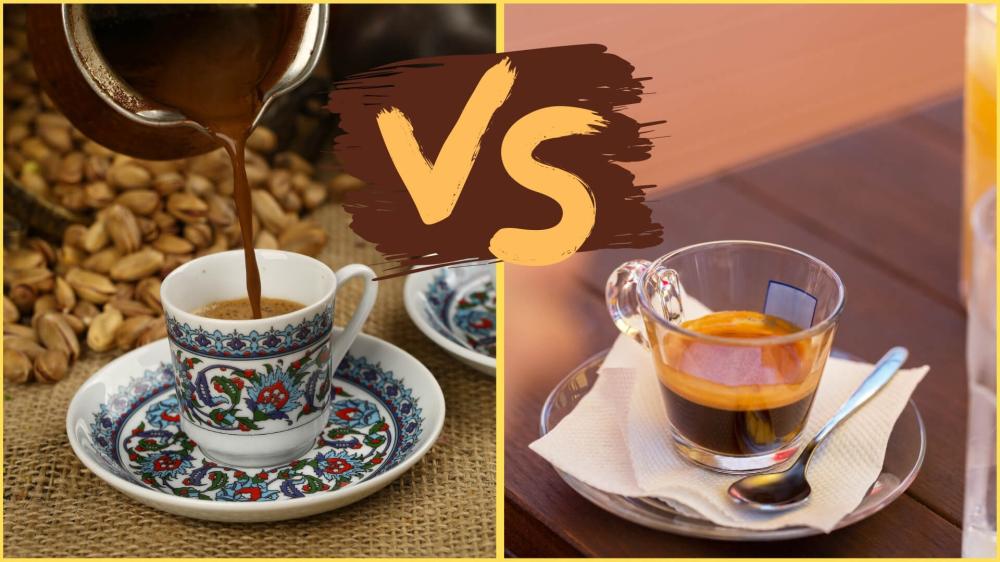Coffee is not just a daily drink, it is a culture with deep roots in history and differs in its method and flavour from one region to another. Between Arabic coffee, which is a symbol of generosity and hospitality in the Arab world, and espresso, which reflects the spirit of Italian culture in its modern style, there is a fundamental difference in taste, preparation, and the traditions associated with them.
In this article, we explore the differences between Arabic coffee and espresso, from their cultural origins to the details of how each type is prepared. You’ll also learn about the features and benefits that make each type have its own fans. Follow along to discover more about the limitless world of coffee.
What is the difference between Arabic coffee and espresso?
Arabic coffee and espresso are two types of coffee that differ in almost everything, from the method of preparation to the flavor and texture. Here are the main differences between them:
1. Preparation method
- Arabic coffee: Traditionally prepared using a dallah, ground coffee is boiled with water and cardamom is added. It is often mild in flavour and served in small cups without sugar.
- Espresso: Prepared using a special machine that uses high pressure to extract coffee. It is served in small cups with a concentrated flavour and a thick, creamy texture.
2. Flavor and texture
- Arabic coffee: It has a light and aromatic flavour due to the use of spices such as cardamom and saffron sometimes. The consistency is light and suitable for those who prefer less concentrated coffee.
- Espresso: It has a strong, concentrated flavour with a blend of bitterness and the natural sweetness of the coffee, and its creamy texture makes it special.
3. Culture and traditions
- Arabic coffee: A symbol of hospitality and generosity in Arab culture, it is often served at social occasions with dates.
- Espresso: An integral part of the Italian lifestyle, it is often drunk on the fly in cafes in the morning or after a meal.
4. Health benefits
- Arabic coffee: It is drunk in small quantities, which makes it less dense in caffeine, and is a good choice for those looking for a light energy boost.
- Espresso: It contains a high percentage of caffeine in a small amount, making it ideal for those who need a strong boost of energy.
5. Submission
- Arabic coffee: served in small cups without handles, often with dates or sweets.
- Espresso: Served in small cups with a handle, it can be drunk on its own or used as a base for other types of coffee such as cappuccino and latte.
Which do you prefer?
Choosing between Arabic coffee and espresso depends on your taste and personal preference. If you like tradition and light flavors, Arabic coffee is your best choice. However, if you are a fan of strong flavors and high energy, espresso is your ideal drink.
The origin of Arabic coffee and espresso
Arabic coffee
Arabic coffee originated in Yemen, where it was first cultivated in the 15th century, and then spread across the Arabian Peninsula to become an integral part of culture and tradition. Initially used as a stimulant during religious and spiritual gatherings, it became a symbol of authentic Arab hospitality, always accompanied by an atmosphere of welcome and generosity.
Espresso
Espresso originated in Italy in the early 20th century with the development of coffee makers. The word "espresso" means "specially prepared coffee" and refers to the quick and innovative method of extracting coffee using high pressure. Espresso became a hallmark of Italian culture and quickly spread around the world.
Tips for making the perfect coffee
Arabic coffee
- Choose high-quality coffee beans and a roast level that suits your taste (light or medium).
- Use pure water and slowly boil ground beans for optimal flavor.
- Add cardamom or saffron to enhance the taste, but in moderation so as not to overpower the coffee flavour.
- Pour coffee from the dallah into small cups for an authentic traditional experience.
Espresso
- Use a well-made espresso machine and set the temperature and pressure accurately.
- Grind the beans very fine and use the appropriate amount (7-9 grams per small cup).
- Extract espresso in 25-30 seconds for a balanced taste and creamy texture.
- Try add-ons like foamed milk to make other drinks like cappuccinos and lattes.
The best types of Arabic coffee
Arabic coffee is characterized by its great diversity that reflects the different cultures and customs in the Arab world. Coffee types differ according to the degree of roasting, the spices used, and the method of preparation. Here are the most prominent types, with a focus on Saudi coffee:
1. Saudi coffee
Saudi coffee is considered one of the most famous and distinctive types.
- Preparation method: It is prepared with light or medium roasted coffee beans, with cardamom as the main ingredient. Saffron is sometimes added to give a luxurious flavour, and cloves can be used to enhance the taste.
- Taste: Mild and aromatic, usually served with dates or sweets.
- Symbolism: A symbol of hospitality and generosity in Saudi society, as it is served on occasions, holidays, and when receiving guests.
Why is Saudi coffee your best choice?
Saudi coffee is not just a drink, it is a rich experience that reflects the authenticity and culture of Saudi society. Its light flavor and distinctive spices make it suitable for everyone, whether you prefer daily coffee or are looking for a special addition for occasions.
Best Espresso Coffee
Espresso coffee is characterized by its great variety, as global brands offer unique flavor experiences to suit different tastes. Here is a list of the best types you can try, highlighting the distinctive types:
1. Illu Arabica Coffee
- Description: Pure Arabica coffee carefully selected to deliver a rich, balanced flavour.
- Taste: Smooth and lightly acidic, making it ideal for those who prefer a light and mild espresso.
- Package: Available in 200g, it is a practical option for everyday use.
2. Illu Risita Coffee
- Description: A special blend of the finest coffee beans ensures a classic espresso experience with a touch of excellence.
- Taste: Strong and concentrated with a harmonious blend of bitterness and natural sweetness.
- Source: Selected grains from certified farms to ensure quality.
3. Illy Bean Espresso Coffee
- Description: A brand known for its high quality and distinctive blends. Made from 100% Arabica beans, it is a great choice for lovers of classic Italian espresso.
- Taste: Smooth and aromatic with hints of chocolate and nuts.
- Presentation: Ideal for use in home and professional espresso machines.
4. Italian Coffee Aiello Risetta
- Description: A blend inspired by authentic Italian coffee traditions, combining traditional flavours with modern quality.
- Taste: Creamy texture and rich flavour suitable for all occasions.
- Use: Ideal for espresso or as a base for cappuccinos and lattes.
5. Italian Aiello Coffee
- Description: Highlights the strong, concentrated flavours that Italian coffee is known for.
- Taste: Deep flavour with light hints of roasted cocoa, making it a great choice for dark coffee lovers.
6. Forty coffee
- Description: A strong and intense blend suitable for those who prefer espresso rich in caffeine and flavour.
- Taste: Moderate bitterness with a creamy body and a thick foam layer.
- Source: High quality beans carefully selected for best results.
Why choose these types?
These types cater to all tastes, from light and moderate espresso lovers to rich and strong coffee lovers. Whether you are looking for a traditional experience or a modern blend, you will find what suits you in this collection at the Rafah Al-Qahwa store, which specializes in providing the best types of diverse coffee. Shop now and choose what you want.

